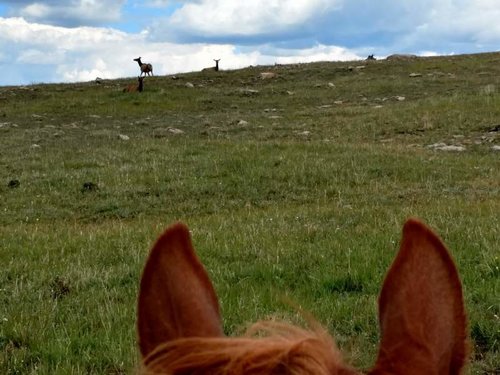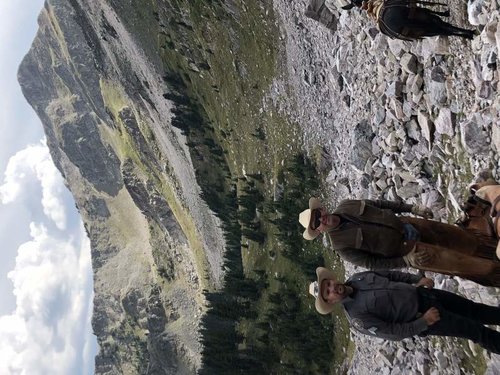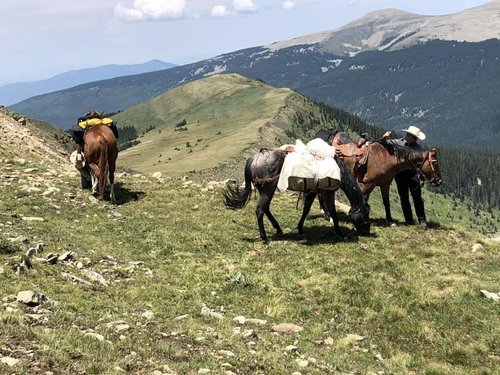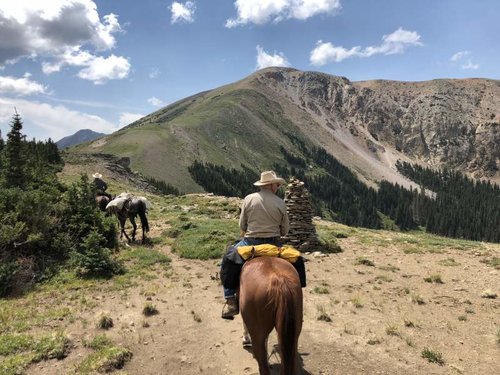Navigation
Install the app
How to install the app on iOS
Follow along with the video below to see how to install our site as a web app on your home screen.
Note: This feature may not be available in some browsers.
More options
You are using an out of date browser. It may not display this or other websites correctly.
You should upgrade or use an alternative browser.
You should upgrade or use an alternative browser.
I have to admit I have a great job
- Thread starter zia
- Start date
Dinkshooter
Well-known member
Even the crabby mules can't make that a bad day!
Very cool, thanks for sharing the photos.
I'm a bit surprised that NMDGF actively salts wild sheep. One strategy domestic sheep producers have proposed in Colorado is to salt bighorns away from their allotments to reduce the risk of contact between domestics and wild sheep. We have adamantly opposed the strategy for many reasons, but obviously there is a concern that should an epizootic occur, it may be exacerbated by the artificial congregation of bighorns at salting locations. Here's a news story from 2010:
I'm a bit surprised that NMDGF actively salts wild sheep. One strategy domestic sheep producers have proposed in Colorado is to salt bighorns away from their allotments to reduce the risk of contact between domestics and wild sheep. We have adamantly opposed the strategy for many reasons, but obviously there is a concern that should an epizootic occur, it may be exacerbated by the artificial congregation of bighorns at salting locations. Here's a news story from 2010:
Durango man fined for baiting bighorn sheep
Posted on June 14, 2010 by Bob Berwyn
Illegal salt licks cause big problems for big game
By Summit Voice
SUMMIT COUNTY — A La Plata County man was fined $156 and lost his hunting privileges
for a year after pleading guilty to to baiting wildlife near Vallecito Reservoir, east of Durango.
Dave Hall, 52, admitted to spreading more than 1,000 pounds of salt during the last two years in
at least four areas. He told Colorado Division of Wildlife officers that he placed salt blocks and
spread granular salt in numerous areas because he believed the bighorns needed extra nutrition.
Baiting big game wildlife in Colorado is illegal and can cause long-term problems for animal
herds. Animals find natural salt licks and don’t need artificial supplements, DOW officials said.
Hall was originally charged with two counts of wildlife baiting and two counts as an accomplice
in the illegal take of two bighorn rams. The plea was entered in Hinsdale County Court, the
county where the violation took place. The district attorney’s office for that area negotiated the
plea agreement.
The salt draws big game and concentrated an unusually high number of bighorns in a small area.
Concentrating animals causes numerous problems: Animals that are bunched up can easily pass
diseases and parasites to each other; they become easy prey for mountain lions and easy targets
for hunters.
There are only three hunting licenses issued for this area and two rams were killed at one of the
bait sites during the 2009 season. The hunters did not know the sites were being baited.
“Once animals get on salt they won’t leave, they get addicted to it. Bighorns naturally migrate in
and out of areas and this has significantly interrupted their patterns,” said District Wildlife
Manager Cary Carron, the Colorado Division of Wildlife officer who investigated the case. “The
other big problem is that the salt is now imbedded in the soil and will attract bighorns to those
areas for the next five years or more. There’s nothing that can be done to get all of it out of the
soil.”
The Pine River herd numbers about 100 animals.
The investigation started in August 2009 when Carron was participating in a standard bighorn
population count. While walking along a ridgeline he noticed signs that showed an unusually
high number of bighorn sheep were using the area. Eventually he came upon two 50-pound salt
blocks that had been placed there.
In the course of the investigation he talked with a U.S. Forest Service biologist and a hunter who
had noticed an unusually high number of sheep staying in the area.
Carron and other investigators started doing surveillance in the area when bighorn hunting
season started in late August 2009. Numerous interviews with informants led them to Hall.
During an interview with Hall in early September 2009, he first denied any knowledge of the salt
licks. Upon further questioning he admitted that he had placed the salt. Hall did not have a
hunting license for that area and said that he did not guide hunters or receive any money for his
actions. He accompanied one hunter who harvested a ram in 2009, but the hunter didn’t know
about the salt.
Baiting of big game is a problem throughout Colorado. If you hear about someone baiting or
notice salt licks in an area where there is no apparent livestock grazing, contact a local DOW
office, or call Operation Game Thief at 1-877-265-6648.
zia
Member
Point well taken Oak and I agree with the potential conflict. We haven't experienced huge congregations of bighorn sheep at any one salt site perhaps because of multiple locations. Another advantage to our sites is when the herd reaches a carrying capacity we put a drop net over a salt site and efficiently capture and relocate as many animals as needed or start a new herd in other suitable habitat (i.e. no domestic sheep). The program has been extremely successful for our area, healthy herds, multiple book rams harvested, youth hunts, ewe hunts....really well managed by the game department. Desert sheep is another success but that is a story for a different post.
Last edited:
I agree that NM does a great job with their sheep management. There are some concerns from both domestic sheep allotments and private hobby flocks, and connected habitat for foraying bighorn sheep does not help the situation. I participate in a monthly conference call working on NM conflicts, the most recent of which was last Thursday. There is documented movement of bighorns between the gorge sheep and those on the Carson NF. There are at least 5 hobby flocks of domestics in very close proximity to the gorge herd, as well as the Servilleta, Santos, and Pintabetoso federal allotments. There is risk of disease of a disease outbreak in the gorge sheep spreading to the Carson.
Anyway, don't want to hijack your post. It's amazing those sheep will let you ride right up on them like that. Keep sharing your photos, please.
Anyway, don't want to hijack your post. It's amazing those sheep will let you ride right up on them like that. Keep sharing your photos, please.
zia
Member
OK thank you Oak, glad you are on the job!
rmyoung1
Well-known member
- Joined
- Jul 12, 2010
- Messages
- 2,409
Something about the look of those NM rams I really, really like. They don’t seem to drop down low below the jaw, but the massive, tight-curling, golden horns make for extremely beautiful rams. Probably the coolest looking bighorns on the planet. Thanks for sharing!
7mm08mo
Well-known member
Yes you do have an awesome job!!!
zia
Member
Northwoods Labs
Well-known member
Great looking country. Keep sharing the pics
zia
Member
This particular day we did a 30 mile loop, long ride for that kind of country. It turned my gluteus maximus into my gluteus-hurt-the-maximus .
el unit
Well-known member
Living the dream right there! It's nice to have an awesome job that let's you spend every day in the Rocky Mountains!
Dukslayer26
New member
- Joined
- Sep 22, 2017
- Messages
- 39
I would say you have the best job ever!! Great pics! Going on a Guided Sheep Hunt in CA in Dec with my buddy and I sure hope we see some rams like those!!
What trail head do you use? My fiance is temporarily living in Penasco while working for the Carson. While visiting last weekend I wished I brought my spotting scope to watch Jicarita Peak with my morning coffee. What a beautiful place.
Similar threads
- Replies
- 55
- Views
- 1K
- Replies
- 4
- Views
- 1K








